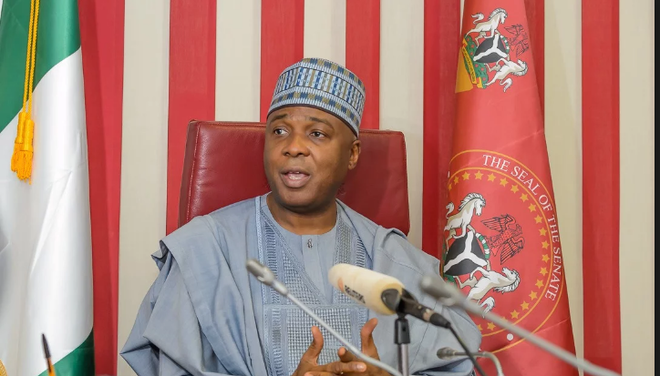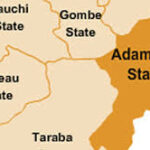If any Nigerian or foreigner is surprised at the expression of interest in the race for Nigeria’s Presidency come 2019, by the Senate President Bukola Saraki, such may be misreading the nation’s political permutations all along. Indeed, hardly has any street level gossip across the country in recent times on Saraki’s political fortunes, has been complete without speculations on his hardly concealed aspiration for a stint as the country’s President. So when he hinted last Wednesday that he was considering joining the race for Aso Rock occupancy in the forthcoming 2019 general polls, it was not ground breaking news.
If anything it was the unusual atmosphere in which his ‘hint’ came that was the issue. It came at the peak of a profusion of reactions from sundry factors, especially the melee trailing his recent defection from the ruling All Progressives Congress (APC) to the Peoples Democratic Party from which he had defected in 2014 to the APC. His hint at participating in the presidential race therefore confirms what has been mere speculation all along and constituted before his leading traducers in the APC, his ultimate sin. To them it was enough irritation from him that he had been daring the powers that be in the party, who had not been at ease with his long suspected aspiration for that office, as it would likely alter the balance of power in the South West, especially for the former Governor of Lagos State Bola Amed Tinubu, and therefore was politically ‘wrong’.
However, seen from a truly nationalistic angle that is devoid of any inclination to the self-interest driven manipulations of the various actors, Saraki’s ‘hint’ has opened up a new dimension in the country’s political turf which ordinarily had always been in a state of effervescence and unending convolutions, with new twists, turns and outcomes, showing up by the minute. The issue of concern is not just about Saraki per se, who for all practical intents and purposes could not but be having the best of his political life, with all the sympathy due to an underdog which he is presently enjoying, as a fallout of the onslaught on him by the APC. It is also not just about the APC whose leadership has recently adopted a self-destruct mindset, without minding much, the longer term consequences of fighting dirty with whoever crosses the line. This is just as the problem also goes beyond the PDP which as the beneficiary of the spoils of crises in its most significant rival party, cannot but celebrate its brightening prospects.
The issue remains more with what the country may be losing in the face of this massive distraction it is subjected to, given the avoidable mismanagement of the ‘Saraki factor’ in Nigerian politics by both the Presidency and the ruling APC. For the past three years, being the greater part of the four year tenure of the present administration of President Muhammadu Buhari and the Eighth National Assembly, the most dominant theme of political discourse in the country has easily been the ‘Bukola Saraki factor’. This is especially so with respect to the relationship between the Executive arm and the National Assembly.
When the matter is not about the man’s defiance of APC leadership to contest the seat of Senate President in the first place, it is about his disloyalty to President Muhammadu Buhari, along with accusations of failure to corral the National Assembly into docile subservience to Aso Rock. In another vein the mention of ‘Saraki’ in public discourse borders on his purely private family ties with his father and sister. “Saraki is…”. “Saraki was..”. Saraki….”. With his declaration of likely participation in the race for the country’s Presidency, he seemed to have committed the ultimate sin by hitting a raw nerve in the electoral calculus of the APC.
Yet all this is happening at the expense of more critical issues in the country that demand prime attention from the leadership than the political fortunes of any single individual. Indeed, if there is a more definitive instance of wasteful distraction of a leadership class than the Nigerian situation, this author is yet to be acquainted with such. To deepen the country’s dilemma is the scary scenario whereby such a situation hardly attracts little more than lamentations from the vocal sections of the citizenry. After all there are countries where derailing leaders are shot to death or at best heavily penalized.
In consideration of Nigeria’s case, a critical weakness of the country’s and indeed African political terrain is the tendency for potentates in power to deliberately abdicate their responsibilities to their constituents, and engage in the penchant of imposing their mindset on their unsuspecting lowers, even when such remains intrinsically toxic. And they usually succeed simply because as soon as any individual ascends into public office, the first assignment is to whittle down public control of his or her conduct of public business in office, even if such tendency would require the unpretentious violation of the extant rules pertaining to the designated office. And this scenario occurs in case after case only because there are virtually no consequences for breaching public trust in office. Is it then surprising that the country’s political culture features the syndrome of politicians offering the electorate mouth-watering promise during campaign time and once they come into office they turn their backs on the very people who facilitated their ascendancy?
In the course of this ‘bring Saraki down’ campaign, the country has lost significant progress especially from the undue, system-wide animosity and mutual acrimony it had generated among the various arms of government, in spite of their common APC base. Typical playouts of this malady include the numerous situations whereby resolutions of the National Assembly are ignored by various arms of the executive including the President himself, just because of Saraki, either manifestly or discreetly.
The high-point of this mistreatment of the National Assembly as the country’s central legislative power house, is the on-going wave of machinations to conscript it as a whipping boy for Saraki’s sins against the APC, – whether real or imagined. Recent plans and pronouncements by the APC National Chairman Adams Oshiomole and some other leading lights of the party including serving Senators and Members of the House of Representatives who should know better, with respect to fighting Saraki including facilitating his impeachment by hook or crook at the National Assembly, qualify as acts against public interest, and therefore grand mischief.
For the purpose of clarification, the National Assembly is the property of all Nigerians, as one of the country’s most hallowed institutions. It is therefore nobody’s private estate. In the same vein any attempt at manipulating and discrediting its procedures, processes and traditions for the purpose of serving as subterfuge for fighting Saraki, constitutes a sin against all Nigerians.

 Join Daily Trust WhatsApp Community For Quick Access To News and Happenings Around You.
Join Daily Trust WhatsApp Community For Quick Access To News and Happenings Around You.


